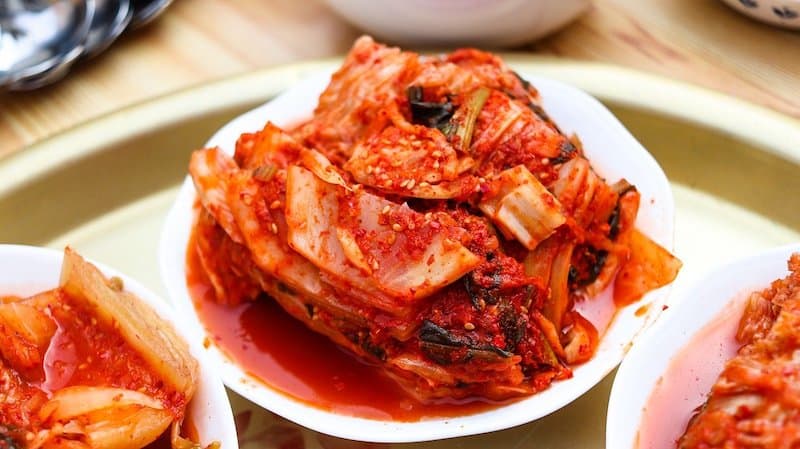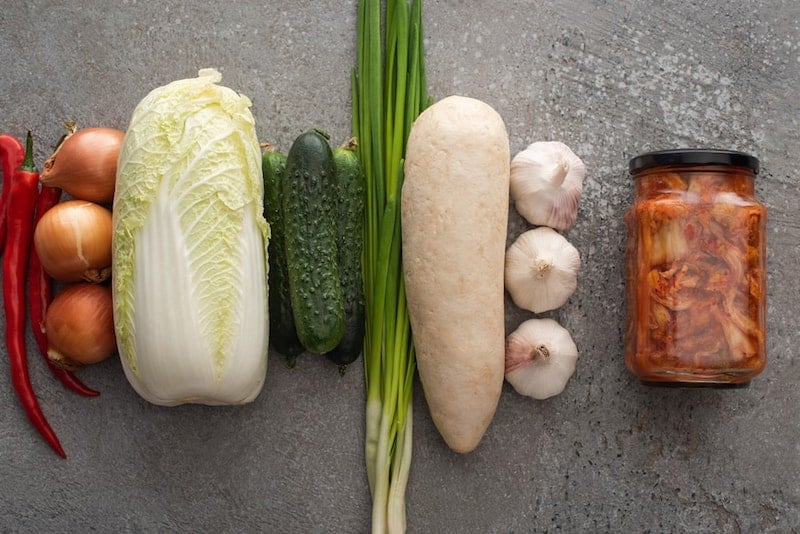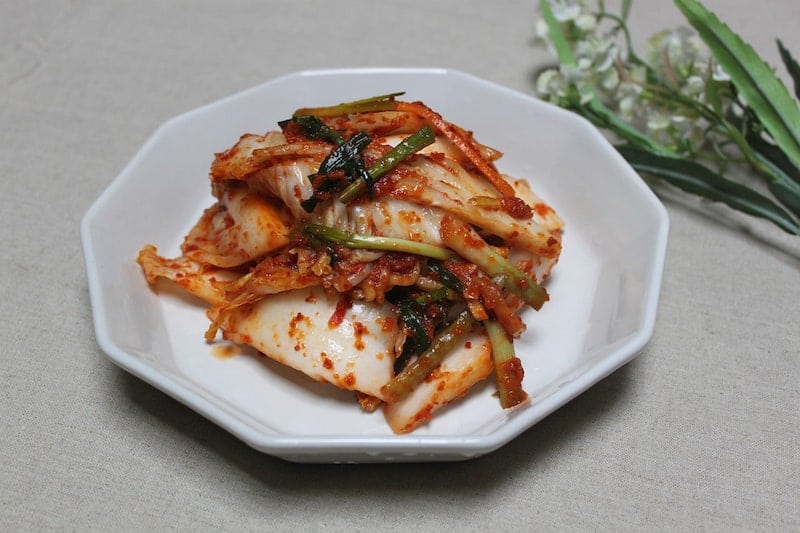Does Kimchi Have Alcohol?
One of the traditional dishes of Korean cuisine is kimchi, a combination of fermented vegetables such as cabbage, radish, and spices.
Kimchi has hundreds of different variations, and since it’s a fermented product, some may wonder if there’s alcohol in it.
So, does kimchi have alcohol? Technically, it does since alcohol is a byproduct of the fermentation process, but the amount of alcohol in it is minimal. Read on for the details and also to learn more about this traditional dish and the health benefits it offers.
Does Kimchi Contain Alcohol?
Due to its nutrients and the production process, kimchi is considered extremely healthy.
It’s a powerful antioxidant that fights different diseases such as high blood pressure and cancer. It also helps strengthen the immune system and has anti-aging benefits.
Kimchi is made with fermented vegetables, namely fermented cabbage. During the fermentation process, lactic acid bacteria and many other beneficial bacteria develop.
The byproduct of some fermentation processes is alcohol. When making kimchi, the most significant byproduct is actually lactic acid. In this case, starches and sugars are converted into lactic acid with the help of lactic acid bacteria. The bacteria kill the harmful microorganisms, thus providing a safe environment and preserving the food.
Ethanol can also be a byproduct of the fermentation process of kimchi. However, only small amounts are present, which usually evaporate or turn into vinegar. Thus, in normal conditions, kimchi contains a minor amount of alcohol.
The regular version of kimchi is vegan and halal (following Islamic dietary laws). But as there are hundreds of different versions of kimchi, not all of them are vegan and halal.
For example, some versions are made with seafood, shrimp, fish sauce, etc. Also, depending on the kind of kimchi you’re making, the level of alcohol might vary.
How Much Alcohol Is in Kimchi?
As mentioned, the type of fermentation involved in producing kimchi is lactic acid fermentation.
The focus is on converting sugars into lactic acid using lactic acid bacteria. The bacteria create a safe environment while killing the harmful microorganisms that might be present.
This type of fermentation is also present when making sauerkraut, yogurt, sour beer, etc.
Under normal circumstances, kimchi contains small amounts of alcohol.
If you have Kimchi and it smells too sour or alcoholic, it may have gone bad.

When Kimchi Goes Bad
If you’re keeping kimchi at room temperature, it should last for about one week after opening. If you’re keeping it in the refrigerator, it can last for about three to six months after opening (because cold temperatures slow down the fermentation process).
Keep in mind that it will continue to ferment if you keep your kimchi at room temperature, impacting the flavor.
If you don’t like the strong and sour taste, you should throw away your kimchi after three months’ storage in the refrigerator. After this period, the flavor will significantly change.
Since there are variations of kimchi, it might go bad even sooner, especially if it contains seafood. That’s why you should always pay attention to the smell and the appearance of mold in the jar. If there’s mold, immediately throw it away.
Even though mold is more likely to develop in warmer temperatures, it can still show up even when kimchi is refrigerated. Besides rotting food, mold is dangerous because it carries harmful bacteria. Avoid smelling kimchi if you see mold because it can cause respiratory problems.
Dangers of Eating Spoiled Kimchi
If your kimchi smells like alcohol, it most likely means it’s spoiled. Eating spoiled kimchi can cause various illnesses:
- Mold can cause nausea, diarrhea, or vomiting. People with weak immune systems and sensitive stomachs are more prone to developing these symptoms.
- If there’s seafood in your kimchi and it has gone bad, you might develop conditions such as botulism, respiratory problems, and in severe cases bleeding.
- Common kimchi ingredients such as cabbage and shellfish can often cause poisoning.
- If you’re making kimchi on your own, make sure to wash the ingredients thoroughly. If you’re buying kimchi, ensure you’re purchasing it from an experienced seller.

Health Benefits of Kimchi
Besides its excellent taste, kimchi has many benefits for your body.
- First, it’s excellent for your digestive system – due to the presence of probiotics in kimchi, it is an excellent source of beneficial bacteria that keeps your digestive tract in good shape.
- It improves your immune system – the probiotics positively affect your whole immune system and help it function properly.
- It can lower cholesterol levels – eating kimchi will help you reduce the level of bad cholesterol (LDL).
- It improves heart health – since it’s a powerful antioxidant, kimchi affects the damaged cells and prevents the development of heart disease.
- It helps with inflammation – the good bacteria in kimchi have an anti-inflammatory effect.
- It improves brain health – an indirect result of a healthy gut is a healthy brain. The enteric nervous system that’s in your stomach communicates with the brain. Therefore, your brain won’t be beneficial if your stomach isn’t healthy, and kimchi is a great way to do so.
- It can help you lose weight – kimchi is a low-calorie dish with great flavor. Eating kimchi will help you eat healthier portions of food. Some people are prone to overeating because their food is bland. Thanks to kimchi’s strong flavor, it’s easier to refrain from overeating.
- It can improve vision – the cabbage from kimchi is rich in beta carotene, which our organism converts to vitamin A, an essential vitamin for eye health.
- It helps prevent yeast infections – the probiotics in kimchi fight fungi such as Candida. Moreover, eating kimchi for a more extended period can reduce the chances of developing an infection.
- It lowers blood sugar – eating kimchi regularly can help get insulin resistance under control.
In Summary
Even though alcohol can appear in kimchi, it’s in small amounts and is perfectly safe to consume.
It’s not often that a dish tastes great and has numerous health benefits, but kimchi is one of them.
Due to so many variations and recipes widely available, you can create a version that you’re bound to enjoy.
Hopefully, I’ve addressed the question of whether kimchi has alcohol. Now that you know the answer don’t hesitate to try it.







